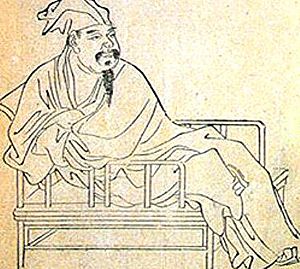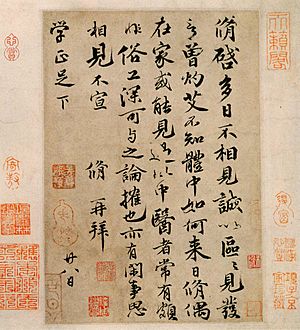Ouyang Xiu facts for kids
Quick facts for kids
Ouyang Xiu
|
|||||||||||||||||||||||||||
|---|---|---|---|---|---|---|---|---|---|---|---|---|---|---|---|---|---|---|---|---|---|---|---|---|---|---|---|
| 歐陽脩 | |||||||||||||||||||||||||||

A contemporary drawing of Ouyang Xiu
|
|||||||||||||||||||||||||||
| Born | August 1, 1007 Mian Prefecture, Song
|
||||||||||||||||||||||||||
| Died | September 22, 1072 (aged 65) Ying Prefecture, Song
|
||||||||||||||||||||||||||
| Occupation | Calligrapher, classicist, epigrapher, essayist, poet, politician | ||||||||||||||||||||||||||
| Spouse(s) |
|
||||||||||||||||||||||||||
| Children |
|
||||||||||||||||||||||||||
| Parents |
|
||||||||||||||||||||||||||
| Chinese name | |||||||||||||||||||||||||||
| Traditional Chinese | 歐陽脩 | ||||||||||||||||||||||||||
| Simplified Chinese | 欧阳修 | ||||||||||||||||||||||||||
|
|||||||||||||||||||||||||||
| Ouyang Yongshu (courtesy name) |
|||||||||||||||||||||||||||
| Traditional Chinese | 歐陽永叔 | ||||||||||||||||||||||||||
| Simplified Chinese | 欧阳永叔 | ||||||||||||||||||||||||||
|
|||||||||||||||||||||||||||
| Zuiweng (art name) |
|||||||||||||||||||||||||||
| Chinese | 醉翁 | ||||||||||||||||||||||||||
| Literal meaning | "Drunken Old Man" | ||||||||||||||||||||||||||
|
|||||||||||||||||||||||||||
| Liu Yi Jushi (art name) |
|||||||||||||||||||||||||||
| Chinese | 六一居士 | ||||||||||||||||||||||||||
|
|||||||||||||||||||||||||||
| Wenzhong (posthumous name) |
|||||||||||||||||||||||||||
| Chinese | 文忠 | ||||||||||||||||||||||||||
| Literal meaning | Cultured and Loyal | ||||||||||||||||||||||||||
|
|||||||||||||||||||||||||||
Ouyang Xiu (Chinese: 歐陽脩; pinyin: Ōuyáng Xiū; 1007 – 1072 CE) was a very important Chinese scholar. He lived during the Song dynasty. He was a talented historian, calligrapher, essayist, poet, and politician.
Ouyang Xiu was known by several names. His courtesy name was Yongshu. He also had art names like Zuiweng (meaning "Drunken Old Man") and Liu Yi Jushi. He was a central figure among the famous Eight Masters of the Tang and Song.
He helped bring back the Classical Prose Movement. This writing style was popular centuries before him. He encouraged it in important government exams. This helped future great writers like Su Shi and Su Zhe.
Ouyang Xiu had many different interests as a writer. As a historian, he helped create the New Book of Tang. He also wrote his own history book, the Historical Records of the Five Dynasties. As a poet, he wrote in both the cí and shi styles. His prose writings, like Zuiweng Tingji, were especially praised.
In politics, Ouyang Xiu supported the Qingli Reforms in the 1040s. These reforms aimed to improve the government. He later became a high-ranking official. He retired from politics in 1071.
Contents
Early Life and Education
Ouyang Xiu was born in Sichuan, China. His family was not wealthy. His father was a judge, but he died when Ouyang Xiu was only three years old.
His mother, Lady Zheng, taught him how to read and write. She was very dedicated to his education. There's a famous story about her teaching him by drawing on sand with a reed. This story shows her amazing effort.
He could not afford a traditional teacher. So, he mostly taught himself. He was greatly inspired by the writings of Han Yu. In 1030, at age 22, he passed the jinshi exam. This was a very difficult test to become a government official.
A Career in Government
After passing his exam, Ouyang Xiu became a judge in Luoyang. This city used to be an old capital. There, he met others who also loved the writings of Han Yu.
In 1034, he moved to Kaifeng, the capital city. He worked at the Imperial Academy. He became friends with Fan Zhongyan, a reform-minded official. Ouyang Xiu supported Fan Zhongyan's ideas for improving the government.
However, Fan Zhongyan was removed from his position for criticizing a powerful official. Ouyang Xiu defended his friend. Because of this, Ouyang Xiu was also sent to work in a different area. This action made other reformers notice him.
The Qingli Reforms
In 1043, Ouyang Xiu and Fan Zhongyan pushed for the Qingli Reforms. These were ten ideas to make the government better. They wanted to improve exams for government jobs. They also wanted to stop favoritism in appointments.
They managed to put some of these ideas into practice. But the emperor soon canceled their changes. Fan Zhongyan and his group lost their power. Ouyang Xiu was again sent to work in the provinces.
He returned to the capital in 1049. After a period of mourning for his mother, he came back to government service in 1054. He slowly moved up the ranks again. By 1060, he was an assistant councilor of the state.
He also became the head of a team. This team was creating the New Book of Tang. He also served as an ambassador to the Liao dynasty. He worked to improve the jinshi examinations.
In the early 1060s, Ouyang Xiu was one of the most powerful people in the government. He held several important positions at the same time.
Later Career and Retirement
Later in his career, Ouyang Xiu faced some unproven claims against him. Even though the claims were false, they affected his reputation. He asked to retire, but the emperor did not allow it. Instead, he was sent to serve as a magistrate in different provinces.
While serving as a magistrate, he disagreed with some new policies. These policies were suggested by Wang Anshi. Ouyang Xiu had helped Wang Anshi's career earlier. But now, they had different ideas about how to run the country. Ouyang Xiu finally retired from politics in 1071.
Ouyang Xiu as a Writer
Ouyang Xiu was a master of many writing styles. He greatly influenced Chinese literature.
Prose Writing
He followed the style of Han Yu in his prose works. This was part of the Classical Prose Movement. Ouyang Xiu helped make this "ancient prose" style popular again. He is considered one of the Eight Masters of the Tang and Song dynasties.
One of his most famous prose works is Zuiweng Tingji. This means "An Account of the Old Toper's Pavilion". The Zuiweng Pavilion is named after him. The essay describes his peaceful life in the mountains. It is praised as one of the best Chinese travel writings.
People who read his work centuries ago enjoyed its playful nature. Later, during the Qing dynasty, readers saw a deeper meaning. They realized the author found true joy in the happiness of others.
Historian Work
Ouyang Xiu led the team that wrote the New Book of Tang. This important historical work was finished in 1060. He also wrote his own history book, New History of the Five Dynasties. He wrote this book privately, and it was found after he died.
He was important for using epigraphy in history. Epigraphy is the study of ancient inscriptions, like those on stone tablets. He believed that studying calligraphy and art objects could help people improve their minds.
There's a story about Ouyang Xiu's writing style. He and his friends saw a horse kick a dog to death. His friends wrote long descriptions. Ouyang Xiu simply wrote: "A galloping horse killed a dog in its path." This shows his clear and direct writing style.
Poetry
Ouyang Xiu wrote both shi and cí poems. His poems are often relaxed and humorous. He even called himself "The Old Drunkard" in his poems.
His shi poems were simple and direct. They avoided the overly fancy style of earlier times. He is best known for his cí poems. His series of ten poems about the West Lake helped make cí a popular form for serious poetry.
Ouyang Xiu's poems explored new topics. He wrote about friends, family life, food, and old objects. He also included political themes. He used a fresh style, with humor and exaggeration. Many of his poems were part of rhyming games.
Here is one of his poems about the famous West Lake in Hangzhou:
Deep in Spring, the Rain's Passed (Picking Mulberries)
Original Chinese text採桑子
春深雨過西湖好,
百卉爭妍,
蝶亂蜂喧,
晴日催花暖欲然。
蘭橈晝舸悠悠去,
疑是神仙。
返照波間,
水闊風高颺管絃。
Legacy and Influence
Ouyang Xiu died in 1072. His influence was huge. Even his political opponents, like Wang Anshi, wrote moving tributes to him. Wang Anshi called him the greatest writer of his time.
Later, during the Ming dynasty, a high official named Li Dongyang admired Ouyang Xiu greatly. He saw Ouyang Xiu as a perfect example of a scholar who served the public and created beautiful art. He praised Ouyang Xiu's writings for their peacefulness and proper style.
See also
 In Spanish: Ouyang Xiu para niños
In Spanish: Ouyang Xiu para niños
- Classical Chinese poetry
- Qingli Reforms
- Song poetry
- Twenty-Four Histories
 | Ernest Everett Just |
 | Mary Jackson |
 | Emmett Chappelle |
 | Marie Maynard Daly |


